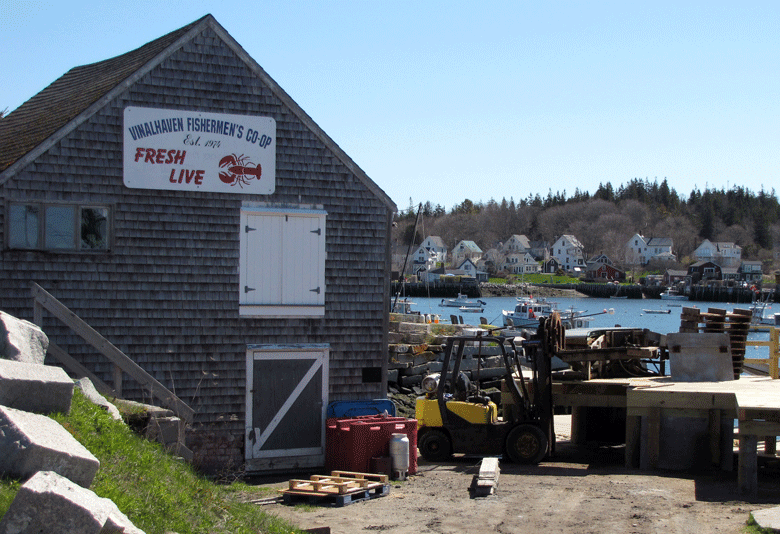Kathleen Billings, Stonington’s longtime town manager, articulated some deep truths to representatives of the Northern Border Regional Commission (NRBC) during a recent visit.
“This is our home,” she said. “Once you are on an island, there’s a different culture to it. You have to be self-sufficient. You have to figure it out for yourselves, that’s what makes us tough. We care about each other and there’s a strong sense of community.”
Over the course of two foggy, rainy days in June, staff with Island Institute staff, Maine’s congressional delegation, and Maine’s Department of Economic and Community Development helped the NBRC understand the unique economic needs, challenges, and opportunities of Maine’s island and coastal communities.
The NBRC is a federal agency that works in partnership with member states to support economic development in distressed or struggling counties across Maine, New Hampshire, Vermont, and New York. The geography is dominated by forests and small rural communities that depend on the woods, paper mills, sawmills, and increasingly, on outdoor recreation—communities like Madawaska, Millinocket, and Bingham.
In Spruce Head and Stonington, we saw the properties adjacent to important working waterfronts that had recently come up for sale…
As a young but growing federal agency, NBRC is continually striving to ensure its work aligns with the needs of the communities it is designed to serve.
“In undertaking this work there is no substitute for listening first-hand to communities describe both the history that has shaped them and their vision for securing a brighter future,” said Chris Saunders, NBRC’s federal co-chairman.
“While needs like infrastructure, housing, and workforce development are shared among nearly all our communities, our policies and investments are stronger when guided by an understanding of the specific ways our communities and businesses hope to address these challenges and the partners they are working with to do so,” Saunders said.

Experiencing coastal communities firsthand helps NBRC be a better partner in Maine.
At the Vinalhaven Fisherman’s Coop, we heard about planning for infrastructure upgrades that will help maintain working waterfront.
Between those working for the coop and the fishermen who use it, this infrastructure supports paychecks for over 5% of the community.
In Spruce Head and Stonington, we saw properties adjacent to important waterfront properties that had recently been listed for sale and been purchased by the owners of the working waterfront to protect their access and business operations against the possibility that “they would’ve had a rich person buy it, put in a big pier with a big boat, and frig everything up,” as one man put it.
“Piecing together a living” is common in these communities and increases in shoulder season income or additional seasonal employment opportunities are a big deal.
At the Spruce Head Fisherman’s Coop, Bob Baines talked about lobstering, scalloping, and his decision to start growing kelp to have some income in the spring.
Next door, Krista Tripp showed off her oyster shack where she sells her Aphrodite Oysters. She talked about being able to leverage her lobster business to support the growth of her oyster business which now employs three. She was optimistic about what the future might hold: “Maine is the perfect place for aquaculture!”
The conversation in Stonington was about transitions. Even fishing has undergone immense transitions over the years. Kim Hutchinson of Project Launch talked about how it’s helping high school students transition to college or explore other opportunities. She also said they are starting to see people in the fishing industry deciding to sell their traps, boat, and do something different. They sometimes need support, too, she said.
Saunders shared themes that have emerged in these rural areas.
“It all comes down to the pathways we can offer people to make a living,” he said. “In rural communities we often see families working together in order to facilitate some sort of entrepreneurial activities. The quality of infrastructure also matters to these communities. You hear it a lot. These communities know you have to take care of the stuff you have.”
Our plans to visit Isle au Haut were interrupted by weather. It was a fitting moment for a trip focused on the unique aspects of island and coastal communities. Adapting to changes in the weather and figuring out how to keep a community moving forward helps make them tough and resilient.
Nick Battista is senior policy officer with the Island Institute, publisher of The Working Waterfront. He may be contacted at nbattista@islandinstitute.org.





